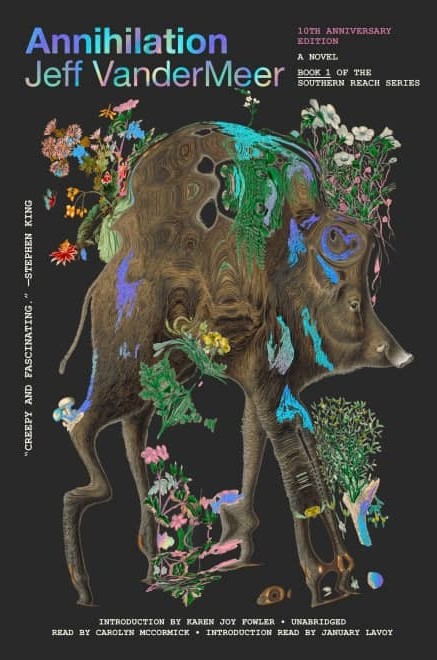The jack of all trades Danny Boyle, despite his cornier films, should be commended for his ability to spot talent. Young and inexperienced Ewan McGregor, Cillian Murphy, Dev Patel, and Alex Garland got their starts working with Boyle, and each now has a legacy all their own.
It was through the excellent film 28 Days Later that I found writer Alex Garland, and his movies in particular are very dear to me. You could argue that he’s lost his touch in recent years (we’ll see about that Elden Ring) but he really has a knack for writing.
Via this Boyle → 28 Days → Garland route, I discovered Garland quietly made a box office flop in 2018, based on some sci fi book. I then discovered that it’s one of the best sci fi movies of all time. And then I read the book. And I have a lot to say.
Annihilation by Jeff VanderMeer is equally excellent in what it tells as in what it doesn’t tell. Many people have described it as a cosmic horror, but there’s very little to do with outer space. Instead, the horror comes from the unknowability of what's on Earth. With all its mysteries and vagaries (which VanderMeer refuses to ever let up), surely everyone leaves it with something different. What I got from Annihilation, I can’t quite ascertain.
But I can tell there’s something in me that wasn’t there before I opened the book’s cover, turned to page one, and started reading, there, “The tower, which was not supposed to be there, plunges into the earth…”
Though difficult to put my finger on a single takeaway, here’s a few potential ones: You might consider them different “readings” of VanderMeer’s mysterious story. Each one has much to shit to talk about humanity: of its many faults, and its strained relationships with nature. Now…
1. Reading Annihilation, what will strike most (most) people is parallels to climate change. There’s a growing wound on the planet where humanity is being driven out. Called Area X, this is the terrifying setting of the novel. All of the characters are scientists, and they toil about in this expanding zone, seeking to understand it. Overhead hangs a pervasive sense of dread. The characters are all extremely destructive, wantonly killing animals, each other, and themselves. At the very center of Area X is a giant bloodbath where people have practically torn each other apart, painting the beach red. This reading of the book believes that humans are destructive and actively killing the planet.
2. My biggest takeaway, supported by the book’s mind-bending narrative, is the unknowability of the world. As early as page 20, going back to that aforementioned tower, words are found scrawled on the walls in lichen. VanderMeer tells us the exact text on those walls, but across the next 200 pages he never, even in the protagonist’s eyes, offers an explanation. Everything, from the events, to the nature of the setting, to the shadow organization, to the other characters, to even the protagonist herself is uncertain. Miracles of life occur, side by side with calamities of life. No one can figure out what the hell is going on. But it doesn’t stop them from trying. This reading of the book believes that humans are hubristic in their seeking of understanding.
3. Another idea, hard to see despite its conspicuousness, is about the role of humans within nature: consider how the main characters are scientists trapped in a jungle. None have names, only roles (biologist, anthropologist, psychologist, surveyor). This jungle metaphorically and literally turns them animalistic. Area X is like a giant terrarium, where life flourishes and the people return to the psychology of primitive monkeys. It’s almost as if the book is taking the perspective of animals... A kind of reverse anthropocene, where the humans are going extinct and nature is the one in control. This reading of the book believes that humans are largely insignificant.
Those are just three potential interpretations I’ve considered, and I’m positive there are more yet. If any of them sound interesting to you, please do read the book. It’s succinct, at around 200 pages, and honestly this post hasn't even spoiled the half of it. If you like books that make you think, cosmic horror, mysteries, “ecofiction,” big pigs, The Elder Scrolls 3, or Björk, do yourself a favor and go check it out!

